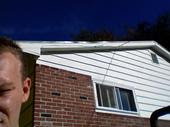
I've just begun exploring
this. It's quite amazing. I always imagined Zukofsky reading in a sort of crisp puckish elenctic staccato, but in fact his reading style brings out the flowing rhythms and (subtly) passionate, romantic qualities in his work—he savors each vowel in a way that reminds me of Yeats or Pound's reading styles, though without any of their vatic bombast. The readings of his Catullus translations clear them up a lot for me, so that they suddenly seem much more readable, a slow trickle of astonishing phrases, which before I had read as a few funny lines and surprising images and dirty bits scattered amid an impossible tangle of latinate "verbage" (as Sarah Palin would say). The secret then is to slow down.
Likewise, A-22— which I've always loved the sights and sounds of but never taken much from in the way of "intellection"—is made instantly lucid by LZ's phrasing in a half-hour
excerpt, which I was just listening to while washing dishes. I didn't realize, or had forgotten, how much it is an old man's wisdom-book, full of bright anecdotes and terse aphorisms (and pressed flowers), like Lao Tzu or Hesiod, or some of Bunting's long poems, a friendly ramble and not (as it sometimes seems on the page) a mere willful volley of radioactive syllables. Dense and pithy and polysyntactic as A-22 is, Zukofsky somehow managed, reading it aloud, to render it at every point
both speech and music—and the music is more flowing, less percussive than I expected.
There's a lot to listen to here, and I hope to spend a lot of time with it soon. Thank you
Pennsound!







